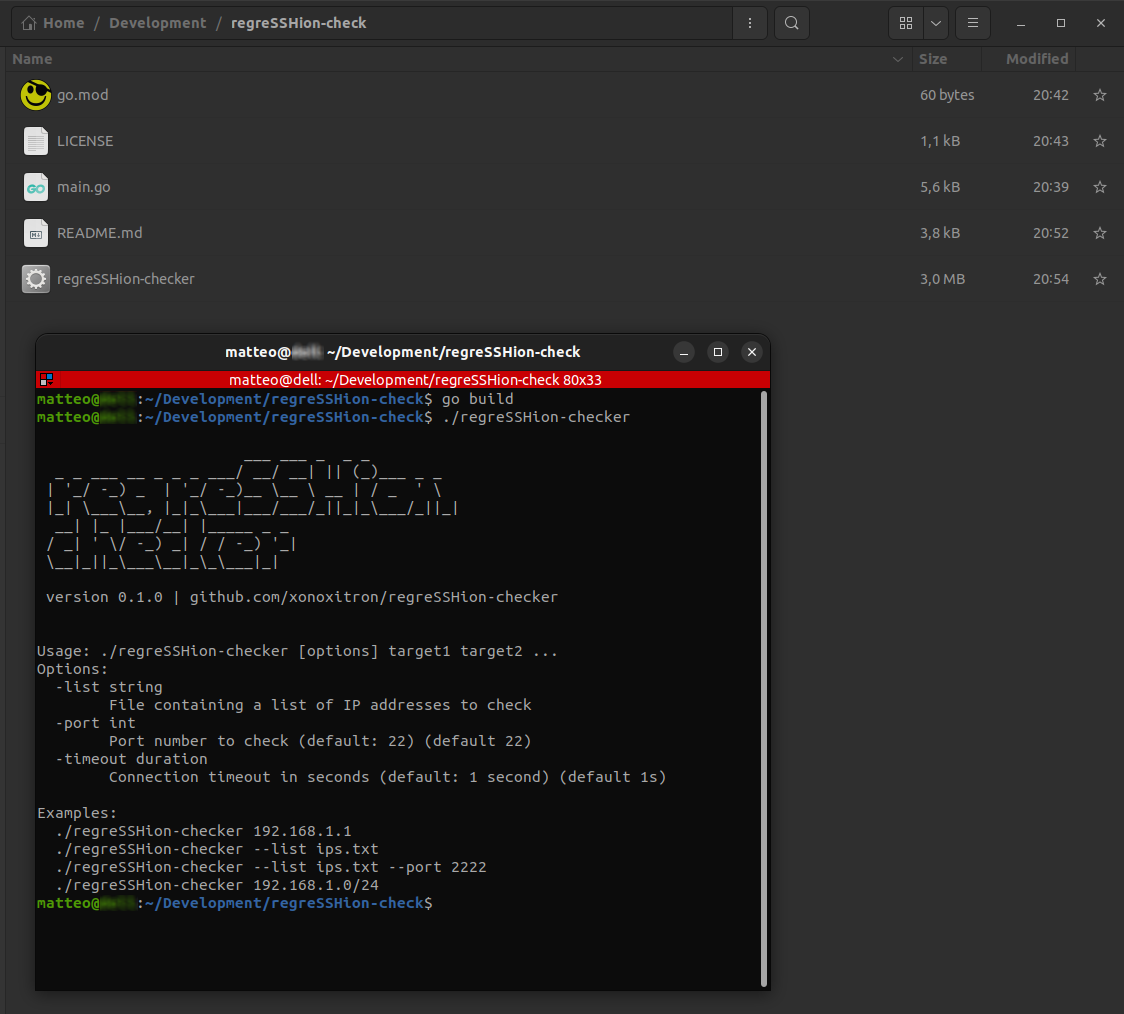## https://sploitus.com/exploit?id=9CDFE38D-80E9-55D4-A7A8-D5C20821303E
# regreSSHion-checker
## 📜 Description
regreSSHion-checker is a lightweight, efficient tool designed to identify servers running vulnerable versions of OpenSSH, specifically targeting the recently discovered `regreSSHion` vulnerability (CVE-2024-6387). This tool facilitates rapid scanning of multiple IP addresses, domain names, and CIDR network ranges to detect potential vulnerabilities and ensure the security of your infrastructure.

## 🌟 Features
- **Rapid Scanning**: Quickly scan multiple IP addresses, domain names, and CIDR ranges for the CVE-2024-6387 vulnerability.
- **Banner Retrieval**: Efficiently retrieves SSH banners without authentication.
- **Concurrency**: Utilizes Go's concurrency model (goroutines) for parallel execution, significantly reducing scan times.
- **Clear Output**: Provides clear, emoji-coded output summarizing scan results.
- **Port Check**: Identifies closed ports and provides a summary of non-responsive hosts.
## 🛠️ Installing or Building
To install regreSSHion-checker from the GitHub repository, ensure you have Go installed and configured properly. Use the following command:
```bash
go get github.com/xonoxitron/regreSSHion-checker
```
After installation, you can use regreSSHion-checker as described in the usage section below.
To build `regreSSHion-checker` from source, ensure you have Go installed and follow these steps:
1. Clone the repository or download the source code.
```bash
git clone https://github.com/your/repo.git
cd regreSSHion-checker
```
2. Build the binary using `go build`.
```bash
go build regreSSHion-checker.go
```
3. Optionally, you can set execute permissions.
```bash
chmod +x regreSSHion-checker
```
Now you can use `./regreSSHion-checker` to scan for CVE-2024-6387 vulnerabilities in OpenSSH across your infrastructure.
## 🚀 Usage
```bash
./regreSSHion-checker <targets> [--port PORT]
```
### Examples
#### Single IP
```bash
./regreSSHion-checker 192.168.1.1
```
#### IPs from a list
```bash
./regreSSHion-checker -list ip_list.txt
```
#### Multiple IPs and Domains
```bash
./regreSSHion-checker 192.168.1.1 example.com 192.168.1.2
```
#### CIDR Range
```bash
./regreSSHion-checker 192.168.1.0/24
```
#### With Custom Port
```bash
./regreSSHion-checker 192.168.1.1 example.com --port 2222
```
### Output
The tool provides a summary of the scanned targets:
- 🛡️ Not Vulnerable: Servers running a non-vulnerable version of OpenSSH.
- 🚨 Vulnerable: Servers running a vulnerable version of OpenSSH.
- 🔒 Closed Ports: Count of servers with port 22 (or specified port) closed.
- 📊 Total Scanned: Total number of targets scanned.
```text
🛡️ Servers not vulnerable: 1
[+] Server at 157.90.125.31 (running SSH-2.0-OpenSSH_8.2p1 Ubuntu-4ubuntu0.11)
🚨 Servers likely vulnerable: 2
[+] Server at 4.231.170.121 (running SSH-2.0-OpenSSH_8.9p1 Ubuntu-3ubuntu0.10)
[+] Server at 4.231.170.122 (running SSH-2.0-OpenSSH_9.2p1 Debian-2+deb12u2)
🔒 Servers with port 22 closed: 254
📊 Total scanned targets: 257
```
## 📚 References
- [Qualys Blog on regreSSHion Vulnerability](https://blog.qualys.com/vulnerabilities-threat-research/2024/07/01/regresshion-remote-unauthenticated-code-execution-vulnerability-in-openssh-server)
---
### Notes:
- Ensure you have Go installed to compile and run the tool (`go build regreSSHion-checker.go`).
- Replace `regreSSHion-checker` with the name of the Go binary compiled from your source file.
- Adjust permissions if needed (`chmod +x regreSSHion-checker`) to execute the binary directly.
This README.md file now reflects the usage and features of the Go version of the regreSSHion-checker tool, providing users with clear instructions and examples for effective vulnerability scanning of OpenSSH servers.